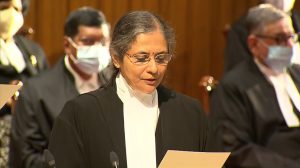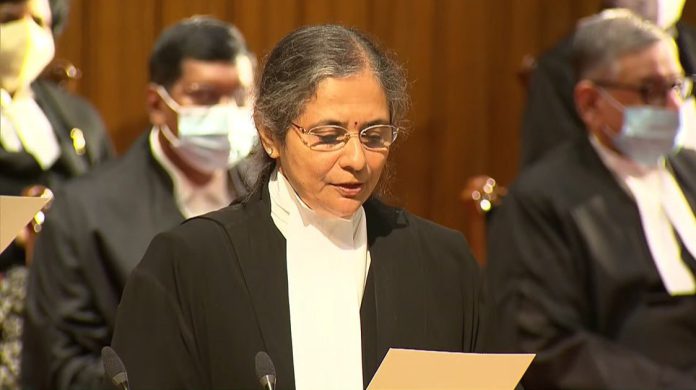Qalam Times News Network | Special Report
Justice Bela M. Trivedi, who recently retired from the Supreme Court of India, has become a subject of national discussion due to concerns over her perceived proximity to the ruling Bharatiya Janata Party (BJP). While her judicial career spans decades and includes appointments to several high courts and ultimately the apex court, it is her actions in politically sensitive cases and her prior administrative role that have raised questions about impartiality within the higher judiciary.

Justice Trivedi previously served as Law Secretary to the Government of Gujarat between 2004 and 2006 during the tenure of then Chief Minister Narendra Modi. This appointment, although administrative in nature, has led critics to suggest that her role during a controversial period in Gujarat’s political history may have influenced her later judicial conduct. Her subsequent elevations to the Gujarat High Court, Rajasthan High Court, and finally the Supreme Court all occurred during the rule of BJP-led governments, which has further fueled speculation about the political backdrop to her appointments.

During her time in the Supreme Court, Justice Trivedi presided over several cases that drew intense public and media attention, particularly those involving activists, opposition leaders, and individuals accused under stringent laws such as the Unlawful Activities (Prevention) Act (UAPA) and the Prevention of Money Laundering Act (PMLA). Critics argue that her rulings in such matters often appeared to favor state authority over civil liberties, and that she maintained a consistently strict approach in denying bail to those critical of the government.
One of the most contentious examples cited is the prolonged imprisonment of student activist Sharjeel Imam, who has remained behind bars for over five years without being granted bail. His continued detention, despite multiple legal challenges, has been viewed by civil liberties groups as indicative of a broader judicial trend that penalizes dissent. Allegations have surfaced that Justice Trivedi, among others, played a role in allowing such delays to persist unchecked during her tenure on the bench.
Noted legal figures including advocate Prashant Bhushan have publicly criticized her approach, describing her as being aligned with state power and less sympathetic to the cause of individual rights. Although no direct evidence exists to suggest that Justice Trivedi was politically affiliated with any party, the recurring pattern of case assignments and rulings under her purview has led to growing concern about implicit bias within the judiciary.
In an unusual departure from court tradition, both the Supreme Court Bar Association and the Advocates-on-Record Association refrained from organizing a formal farewell upon her retirement. Legal observers have interpreted this decision as a silent reflection of discontent within sections of the legal fraternity, especially regarding her handling of politically sensitive matters.
While Justice Bela Trivedi’s judicial contributions and administrative experience are not in question, the nature and perception of her judgments have left a lingering debate about the boundaries between law and politics in contemporary India. As more voices from civil society and the legal community call for transparency in judicial functioning, her legacy continues to be re-examined not only through the prism of law but also through the lens of democratic accountability.







